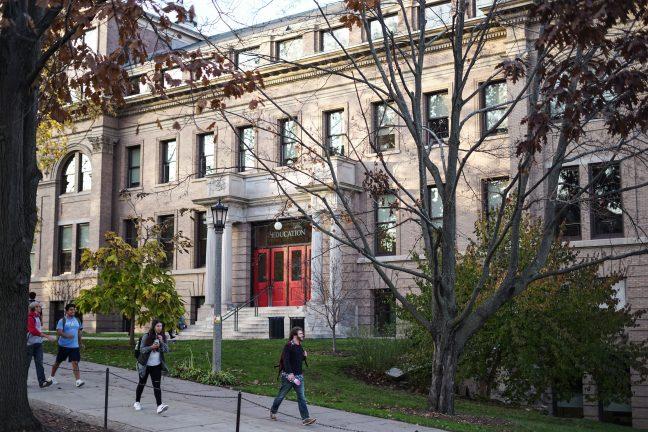The University of Wisconsin’s School of Education extended its Teacher Pledge Program to combat the current shortage of teachers according to a news release.
The School of Education’s dean Diana Hess announced March 1 the program will be extended through the 2025-26 school year.
Launched in the summer of 2020, the program pledges to provide financial support — including in-state tuition, fees, and testing certification costs — for students enrolled in one of the School’s teacher education programs, according to the Teacher Pledge website. In return, students teach for three to four years at a pre-K through 12th-grade school in Wisconsin after graduation.
Students who go on to teach in a high-need district or in a high-need subject area will fulfill their obligation in three years, while all others will do so in four, according to SoE Communications Associate Director, Todd Finkelmeyer.
High-need subject areas are defined annually by the Wisconsin Department of Instruction. These subject areas include bilingual education, special education, mathematics, reading and more. High-need qualifying schools, in Wisconsin, Title I districts, are defined annually by the US Department of Education Office of Federal Aid.
The Teacher Pledge program comes at a time when the U.S. is experiencing a teacher shortage and having difficulties filling classrooms, according to data released by the U.S. Department of Education. The teacher shortage affected every state in the country during the 2017-2018 school year, according to this data.
The COVID-19 pandemic has exacerbated the impact of the teacher shortage, with challenges caused by online learning and quarantine periods.
While there are many factors that have contributed to the development of this teacher shortage, some of the primary contributors include high rates of retirement from educators of the baby-boom generation, declining interest in an education career among students and high rates of teacher turnover, according to National University.
Given that UW’s Teacher Pledge program is new, the university is researching its effectiveness and will be sharing key findings to help aid efforts across the nation in strengthening the teacher workforce, Finkelmeyer said.
According to some students in the School of Education, the Teacher Pledge has significantly contributed to the betterment of their experiences.
Camryn Booms, who is pursuing a masters degree in the Department of Curriculum and Instruction, previously earned a B.S. in Biology and Psychology from Ferris State University in Michigan. If it weren’t for the Teacher Pledge and the financial support it provides, Booms would not have considered attending UW.
“I knew I wanted to go to a bigger university for my postgraduate education and was looking around at different programs, trying to find the best one for me,” Booms said. “When I found out about the Teacher Pledge, I knew Wisconsin was the best fit.”
Being from Michigan, Booms would have to pay out-of-state tuition for her program at UW — if it weren’t for the Teacher Pledge, she said. According to the Bursar’s Office, out-of-state tuition is nearly double the price of in-state tuition for Booms’ program. The financial support of the Teacher Pledge coupled with supplementary School of Education scholarships made Booms’ cost of attendance comparable to what it would have been if she had attended a university in Michigan.
“Knowing that I won’t have any debt from this program and that everything was very nicely set up is a big stress reliever,” Booms said. “I can ultimately go into the field of teaching and not have to worry about paying student loans.”
Trixie Cataggatan, who is pursuing a degree in Early Childhood Elementary Education and is expected to graduate in the spring of 2023, has also reaped the financial benefits of the Teacher Pledge. By having her tuition covered for her junior and senior years, Cataggatan can relieve her family of this financial burden.
Cataggatan was inspired to become an educator because of her own positive experiences with teachers as a student. Her identity as an Asian-American woman has also played a role in her desire to become a teacher.
“Representation in the classroom has a major impact on students,” Cataggatan said. “I didn’t have that representation and I take a lot of pride in my cultural identity, so I want to be that figure for my students who are either Filipino or also Asian American.”
A study by the Learning Policy Institute found that BIPOC representation in teaching helps boost the academic performance in BIPOC students. According to the study, this representation can help improve reading and math test scores and graduation rates among these students.
According to the study, maintaining this representation can be difficult, given the lack of ongoing support new teachers sometimes experience, driving high turnover rates.
Cataggatan said the Teacher Pledge not only has an impact on her but on the field of education in general.
With the Teacher Pledge, students are ensured that their tuition funds are being covered and schools are being ensured that future educators will be there, Cataggatan said.
“Those who are donating clearly see the importance of educators to the future,” Cataggatan said. “That money helps me have the proper materials, learning experiences and training that I need to be a supportive teacher in the future and so that I can make an impact on my future students.”
Cataggatan said the Teacher Pledge also helps with acknowledging the field of teaching in general. Though central to every profession, teaching is often overlooked, she said.
As the U.S. continues to grapple with strategies to address the teacher shortage, programs such as the Teacher Pledge may prove to be effective in addressing this situation. UW will report on the effectiveness of the Teacher Pledge in the future, according to Finkelmeyer.
The March 1 announcement also included information that UW researchers will study the pilot program and share their findings for building a sustainable teacher workforce.
“Our Teacher Pledge program holds great potential for the state of Wisconsin. We have to explore solutions quickly” Hess said in the release.



